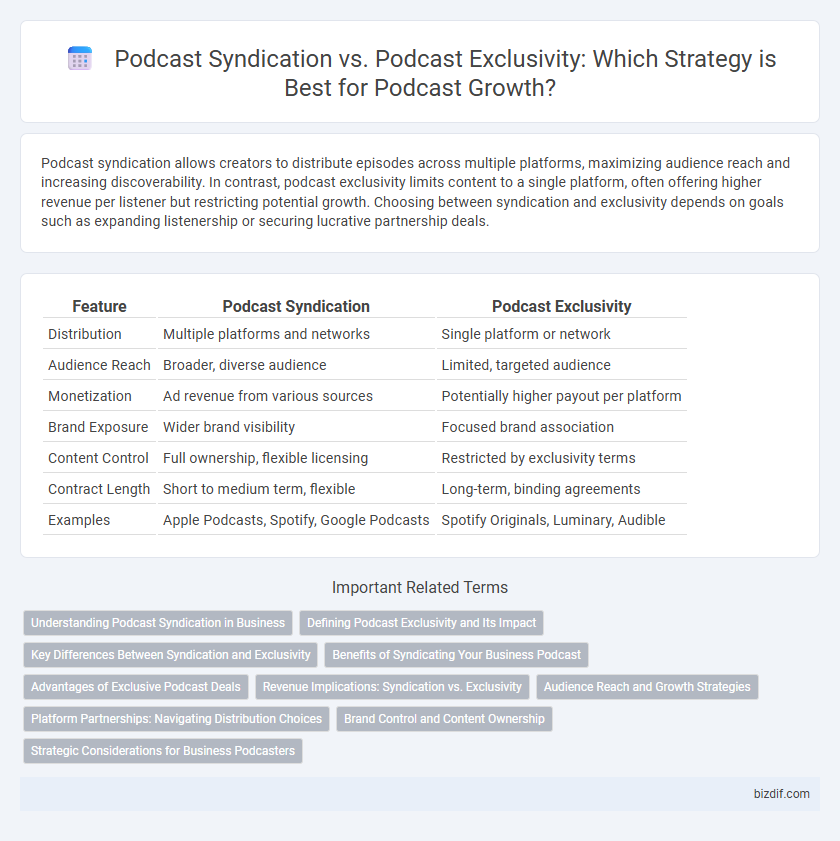Podcast syndication allows creators to distribute episodes across multiple platforms, maximizing audience reach and increasing discoverability. In contrast, podcast exclusivity limits content to a single platform, often offering higher revenue per listener but restricting potential growth. Choosing between syndication and exclusivity depends on goals such as expanding listenership or securing lucrative partnership deals.
Table of Comparison
| Feature | Podcast Syndication | Podcast Exclusivity |
|---|---|---|
| Distribution | Multiple platforms and networks | Single platform or network |
| Audience Reach | Broader, diverse audience | Limited, targeted audience |
| Monetization | Ad revenue from various sources | Potentially higher payout per platform |
| Brand Exposure | Wider brand visibility | Focused brand association |
| Content Control | Full ownership, flexible licensing | Restricted by exclusivity terms |
| Contract Length | Short to medium term, flexible | Long-term, binding agreements |
| Examples | Apple Podcasts, Spotify, Google Podcasts | Spotify Originals, Luminary, Audible |
Understanding Podcast Syndication in Business
Podcast syndication enables businesses to expand their audience reach by distributing their content across multiple platforms, increasing visibility and potential listener engagement. Syndication allows for greater brand exposure and monetization opportunities through diverse advertising channels and cross-promotions. Choosing syndication over exclusivity provides scalability essential for growing podcasts aiming to penetrate various markets efficiently.
Defining Podcast Exclusivity and Its Impact
Podcast exclusivity refers to the arrangement where a podcast is available only on a single platform, restricting its distribution and accessibility across multiple channels. This strategy can enhance platform loyalty and create premium content appeal but may limit audience growth and reduce discoverability for the podcast creator. Understanding the impact of exclusivity is crucial for podcasters aiming to balance revenue opportunities and audience reach.
Key Differences Between Syndication and Exclusivity
Podcast syndication allows creators to distribute episodes across multiple platforms, increasing reach and accessibility for diverse audiences. Podcast exclusivity restricts content to a single platform, often providing higher revenue shares or promotional support but limiting listener availability. Choosing between syndication and exclusivity depends on goals like audience growth versus monetization and platform partnership benefits.
Benefits of Syndicating Your Business Podcast
Syndicating your business podcast expands your audience reach by distributing content across multiple platforms such as Spotify, Apple Podcasts, and Google Podcasts, increasing discoverability and brand visibility. This approach enhances SEO benefits by generating backlinks and driving consistent traffic to your website or landing pages, boosting overall online presence. Furthermore, podcast syndication enables data-driven insights from diverse listeners, helping refine marketing strategies and improve content relevance.
Advantages of Exclusive Podcast Deals
Exclusive podcast deals offer creators increased revenue opportunities through higher upfront payments and premium sponsorships. These agreements enhance brand visibility and audience loyalty by limiting content distribution to a single platform. Exclusive content availability drives subscriber growth for platforms, boosting discoverability and sustained listener engagement.
Revenue Implications: Syndication vs. Exclusivity
Podcast syndication allows content creators to distribute episodes across multiple platforms, maximizing audience reach and diversifying revenue streams through ad placements and sponsorships. Exclusive podcast deals often come with upfront payments or guaranteed advertising revenue but limit exposure to a single platform, potentially reducing overall audience size. Balancing syndication and exclusivity is essential for podcasters seeking to optimize income while maintaining audience growth.
Audience Reach and Growth Strategies
Podcast syndication amplifies audience reach by distributing episodes across multiple platforms, increasing visibility and attracting diverse listener demographics. In contrast, podcast exclusivity fosters loyalty and deeper engagement by offering unique content on a single platform, but limits potential audience growth. Effective growth strategies balance syndication's broad exposure with exclusivity's targeted community building to optimize listener expansion and retention.
Platform Partnerships: Navigating Distribution Choices
Platform partnerships significantly influence podcast distribution strategies by determining reach and monetization potential. Podcast syndication enables broader audience access across multiple platforms, enhancing discoverability and revenue streams. In contrast, podcast exclusivity fosters deeper collaboration with a single platform, often securing financial incentives and tailored promotional support.
Brand Control and Content Ownership
Podcast syndication allows creators to distribute their episodes across multiple platforms, maximizing reach while retaining full ownership and brand control. Exclusivity agreements often limit content availability to a single platform, granting that platform significant influence over branding and episode distribution. Maintaining content ownership ensures long-term revenue opportunities and flexibility in marketing strategies for podcasters.
Strategic Considerations for Business Podcasters
Podcast syndication enables business podcasters to maximize audience reach by distributing episodes across multiple platforms, increasing visibility and potential advertiser appeal. Podcast exclusivity fosters brand loyalty and control over monetization by limiting content to a single platform, often resulting in higher revenue shares and deeper audience engagement. Choosing between syndication and exclusivity hinges on strategic goals such as expanding market presence versus cultivating a dedicated listener base.
Podcast syndication vs Podcast exclusivity Infographic

 bizdif.com
bizdif.com